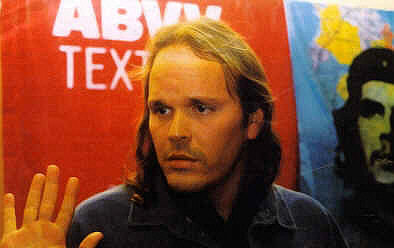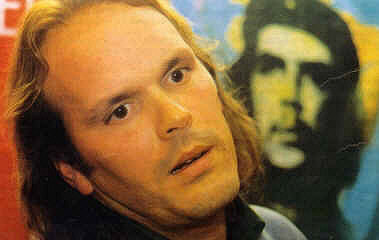Camilo
Guevara, son of El Che in Belgium
Excerpts from interview in ‘HUMO’ nr.
43/3032 16 October 1998

Q: You didn’t really know your father. You where
five years old when he died. You probably know him like we all do: out of books.
Guevara: I have a few memories, but vaguely, things
I’m not even sure off that they really happened or that I dreamed them, fantasy. I
know him through the stories that my mother, family and friends of my father have told me.
Q: For believers in the free market and the Americans, he is a
devil.
Guevara: That’s their problem, not mine. He is a
devil for the US government and American multinationals. Not for the North-American
people. I am convinced that many North-Americans admire and respect El Che, that they love
him and that they fight injustice in American society under his banner. In the US there is
a movement that declares its solidarity with Cuba and tries to lift the economic blockade.
Q: Your father’s live ended in controversy. He left Cuba
because the Soviets came, whom he did not trust, so they say, and had problems with Fidel
Castro who became more and more a pragmatic head of state.
Guevara: That isn’t true. My father left Cuba
because he was an eternal revolutionary. He wrote as much in letters that might soon be
published. He had no quarrel with Fidel at all. Fidel and Che stayed friends, brothers and
comrades until the end. That they had problems with one another is a lie which was already
launched before El Che’s death. The period he was in Congo during the sixties and the
capitalist countries didn’t know where he was, the Western press wrote some crazy
stories: he was dead; he was locked up in a Cuban jail. With these lies they wanted to
harm the Cuban revolution and Fidel Castro as one of the international leaders of the left
and of the poor in the world, still eighty percent of the world population today. On the
other hand they tried to convince people that the revolutionary Guevara, this great
symbol, wasn’t all that, but a man who had to flee from Cuba because he had problems
with his colleague -revolutionary Fidel Castro.
Q: How is life for the son of El Che in Cuba?
Guevara: You want to know if I’m privileged?
Children of ‘the symbol’ have one advantage: a great part of the Cuban people
still loves El Che. I often feel awkward about it, but a lot of Cubans treat us, the
children of El Che, more warmly than others. I feel that the Cubans convey their affection
that they had for my father onto me and my family. In that way we are indeed privileged.
Q: How are things in Cuba today? The economic situation seems to
improve gradually?
Guevara: 1994 was rock-bottom for us. After that the
Cuban economy gradually began growing again, which was a miracle, really. And El Che had
nothing to do with it! (Laughs) Or maybe, a little. That year made a great
impression on us all. Imagine: a country which is the victim of a rigorous economic
blockade all of a sudden also loses eighty percent of its trade due to the collapse of
Eastern Europe. At the same time the blockade is even tightened, and the prices of Western
goods, which we desperately needed just like any other Third World country, keep on
rising. And still we managed to let our economy grow. That is the miracle. A very
dangerous example. We achieved this without one cent from the International Monitary Fund,
nor of any other international financial institution whatsoever! We have showed that you
can achieve a lot without money, but with a great political will. I suspect that
capitalists around the world are a bit anxious that this example might be followed in
other countries. That’s why they try to destroy us with even greater vigour.
Q: El Maximo Lider Fidel will sooner or later disappear from the
scene. He is 72 now. What will happen then? In Florida huge groups of Cuban exiles are
waiting for the day they can reclaim Cuba.
Guevara: There are few thing of which one can be sure
in this world. (Laughs) The Cubans in Florida where already convinced back in
1959 that they would re-conquer Cuba quickly. Ha! We are forty years further now, and they
are still in Florida. When Eastern Europe collapsed, they knew for certain: we take Cuba
back! In the meantime that’s nine years ago.
For sixty years, from the beginning of the century until the end of the fifties, Cuba was
a colony of the US. We know capitalism, we have experienced its deeds. Until Fidel and a
group of youngsters launched the revolution. What do you think the Cuban people are going
to do after Fidel’s death? Do you think that everybody wants to go back to the period
before 1959; that the people will allow the US to come and boss us around?
Q: Wouldn’t it be possible that the Cuban regime imploded?
The consumption goods of capitalism are very seductive. One notices it these days in
Havana.
Guevara: In the West capitalism seduces many people,
yes. And maybe a few ignorant people in the Third World too…
Q: Oh come on, the Cuban youth wants Nikes and Marlboro’s,
Coca-Cola and walkmans too.
Guevara: Without a doubt, without a doubt. But that
isn’t the majority of youngsters. Never! The Cuban people have reached a level of
political and cultural awareness that cannot easily be ignored. The Cubans have seen what
has happened to Eastern Europe: before the collapse of the Berlin Wall they had promised
these people heaven, but what did they get? Nothing, absolutely nothing, except chaos and
exploitation. We Cubans know this, we see it and we don’t want it to happen to us.
OK, there are still some people that want to sell us out to the US. But they are a
minority.
Q: Wouldn’t it be wiser to completely ignore the US and
tighten the economic ties with Europe?
Guevara: The Europeans aren’t philanthropists
either, hey. You have to be realistic: our relationship with Europe depends on what we can
earn from one another. But the US executes pressure onto Europe, a lot of pressure.
Northern-Europe resists the Helm-Burton law (American law that tries to prevent
non-American industry to trade with Cuba) and we are glad about that. But is that because
the Europeans are in love with Cuba? No, its a question of sovereignty. How can one
country accept that another country forbids it to trade with the rest of the world?
Q: Until recently Cuba was a isolated socialist
‘paradise’. Now you receive thousands of tourists and businessmen from Europe
and South-America. Is that positive?
Guevara: Cuba has never been as isolated as you think.
We have always had good contact with Europe. With Eastern-Europe, sure. But we have always
been open to the European culture. In the past we have never promoted mass tourism from
Western-Europe because we didn’t need it. Now it has become our most important source
of income and a way to attract foreign investments.
Q: But mass tourism has a shadow side too: prostitution.
Guevara: For me it has more to do with the crisis of
human values all over the world, than with tourists coming to Cuba.
Q: You really belief that?
Guevara: There’s prostitution in Belgium as well.
I have seen it with my own eyes. People who have enough money to live on don’t
prostitute themselves. People who lack money, do. Why?
Q: Because they want money?
Guevara: No! If I had no money and would go hungry
every day, I would not prostitute myself! It is a question of values. So, what can we do
about it? Must we throw out all tourists, or do we have to make sure that people do not
only have enough money, but also have respect for the essential human values? In any case
we are working hard to force back prostitution.
Q: You work for the Ministry of Fishery. Strange that you have
such ministry. Cubans hardly eat fish.
Guevara: That’s true. But there is improvement. In
the past, eating fish was for the poor. Or food for cats and dogs. Now we try to promote
the fish consumption through fairs and feasts.
Q: Even Fidel seems to interfere?
Guevara: Yes, he once did an advertisement on TV. One
saw an empty table in an empty room. Fidel entered and sat himself behind the table,
looked into the camera very seriously but didn’t say a word. After a while a waiter
entered and served him a plate of fish. Fidel ate the fish in silence. This took a few
minutes. When only the fish-bones where left on his plate, Fidel rose up, looked
imperatively into the camera, and spoke to his people the historical words " And now,
YOU" And now we all eat fish.

|